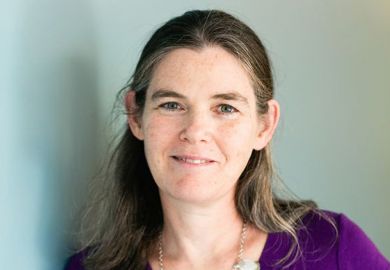Officially, I left academic science in 2016; but in my heart, I left several years earlier.
I stayed around, torturing myself with expectations I didn't agree with in what became a horrible environment, because, on the face of it, I had it good. Even before a cost-of-living crisis, a pandemic and (just) before Brexit, the university provided a bubble – relative security, especially as I had a young family.
But if you’re reading this, you know the stats. You might wonder, as I did, if the academics who were leaving were happier. Would I be? I had a plan: training as a well-being coach to help people like I had been – too busy to think, too proud to question, but certainly unhappy with how things were. I didn’t want anyone else to take three years to make a change.
So here are a few thoughts, not with the haste of someone diving out of a laboratory window, but considered reflections after a few years away. They’re stories, not stats – bits of my own, and those of academics I’ve worked with, intended as a glimpse at how we navigated the crossroads.
Don’t be put off by a leap of faith – it can start with a step
When I first thought about leaving, I read a self-help book that invited a “laser focus” on the big leap out of academia. But as a new dad, I was lucky if I could focus on the toast I was buttering. More than that: with dependants, I couldn’t afford bold decisions.
After months of sleepless nights, from a powerful mix of anxiety and newborn lungs, my wife suggested a side hustle – tutoring. That simple decision, to teach a bit of biology while still at the university, gave me so much: confidence in meeting “civilians”, independent cash, experiences that weren’t tied to a lab bench. Alongside coaching, I'm an online A-level biology tutor, and I love it. My clients found their own sense of perspective in other ways – joining a running club, taking a “job for now”, planting a foot outside of academia.
Later they might decide on a multimillion-pound biotech startup. But they took a step. Laser focus can wait.
Recognise and value your experience
Like The Karate Kid’s Daniel LaRusso finding he can suddenly block punches after sanding floors in the summer holidays, a PhD reveals skills that are already there. In fact, academia uniquely rewards and prepares for self-propulsion. The caveat of course is that some academics are rewarded for being excellent scientists (which they are supremely qualified for) with the opportunity to be managers (which, sometimes, they aren’t).
Again, finding common ground with my clients, and maybe you too, our PhDs give us patience, motivation, determination and resilience – qualities, values, perhaps cliches? – which come in very handy at crossroads. But there’s also anger – the festering kind that, harnessed in the right way, acts like rocket fuel, whether you want to move upwards, sideways or as far away from academia as possible.
Embrace what makes you you
There’s a lot of scepticism around life coaching – academics generally don’t like wishy-washy-ness or being told what to do. Some probably expect sarongs and towers made of beach pebbles. I’m afraid the reality can be far more uncomfortable. It’s about helping you to answer two questions: “who are you?” and “what do you (really) want?”
Asking “who am I?” is easily dismissed as navel-gazing, yet it’s at the core of your CV, your fellowship application or your business plan. Exploring your values and what makes you unique takes time, especially if you’ve spent a career carrying a university’s values with you.
I find a lot of my academic clients’ values overlap – curiosity or challenge are common motivators, but others are more surprising (for them and me): family, power, kudos, teamwork, problem-solving, solitude…A university is a collection of individuals, after all.
Question what you want
The ladder up the ivory tower keeps hitting ceilings. Often there’s fierce competition for the next rung – the numbers are truly terrifying. With no judgement, some clients realised this was exactly what they wanted – it was in line with their values – and sacrificed family time or mental and physical health in the fight for a tenure track position or head of department role. Others realised, often emotionally, that their priorities lay elsewhere. Many clients found courage in a bad experience – to be a better scientist, group leader or head of department than their current boss. Of course, clarity will not get you a position on its own, but for many it’s what they need at a crossroads. (And, it turns out, what many employers crave in interviews.) In 2013, I would have given anything for a clear path. Looking back, it seems so simple.
Will I be happier?
There are aspects of academic life I miss – the view from seven years on is rose-tinted. Every “heated debate” is balanced by colleagues who became friends or the occasional exciting result. Sure, it might be cathartic to moan about what tipped you into making a change – perhaps you’re sick of your ideas being stolen, or the brazen “characters” one finds in science. But the anger fades. On the day I left there were no fanfares, no bridges burned. I just walked out.
And the further away that day gets, the more the focus shifts from leaving to arriving. It needn’t be a different career. It needn’t be a different building! But making any change gives you autonomy. I wouldn’t be here without having been there. And for me, and maybe you, it’s a much a happier place.
John Ankers has a PhD in cell biology and systems biology. He is a writer, tutor and well-being coach for scientists.
Register to continue
Why register?
- Registration is free and only takes a moment
- Once registered, you can read 3 articles a month
- Sign up for our newsletter
Subscribe
Or subscribe for unlimited access to:
- Unlimited access to news, views, insights & reviews
- Digital editions
- Digital access to THE’s university and college rankings analysis
Already registered or a current subscriber? Login








